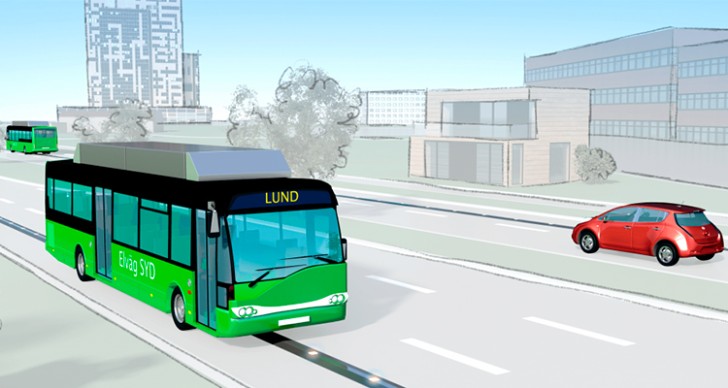Today, we explore an interesting project from the South of Sweden, from the city of Lund, that is looking into building a visionary electric road to move past the fossil dependency in domestic transportation.
EVolution Road is the name of the project that is advancing Swedish domestic transport by leaps and bounds towards a new fossil-free system. It’s a public-private consortium, supported by the Swedish Transport Administration (Trafikverket), that aims to respond to the difficulties the users have encountered to charge their electric vehicles due to the lack of infrastructure. They are currently carrying out tests in a demonstration site to obtain more information and data about smart roads that charge parked or driving electric vehicles. The initiative began in 2019 and will continue its work until 2022. And the
Swedish Transport Administration has already invested SEK 84 million - out of an overall budget of SEK 96 million. The tests will come in handy to provide the necessary insight on technology, operation, maintenance and environmental impact for the development of the most optimal solutions.
Moving past fossil dependency and towards the electrification of mobility
Today, domestic transport accounts for one-third of greenhouse gas emissions in Sweden. In that sense, the EVolution Road initiative is in line with the country’s target to reduce greenhouse gas emission reduction by 63% by 2030 (compared to 1990 levels).
The goal for 2045 is to have zero net greenhouse gas emissions and become fossil-free. And as Sweden's Minister for Energy and Digital Development, Anders Ygeman said at the inauguration of Lund Smart Road in June: "To achieve climate goals, electrification of transport is essential.”
Electric road - a game-changer for vehicle charging
One of the biggest barriers to the wider adoption of electric vehicles is the lack of proper infrastructure that would support the use. The advantages of integrating the charging solution to the road itself come in all shapes and sizes:
- The users could charge the battery anywhere on the go and battery could be smaller. This would result in lighter vehicles, increased passenger capacity and lower environmental impact.
- The road could take advantage of its surroundings, so the electricity could be produced locally and sustainably from sources such as solar, wind and hydroelectric power.
- It would make use of an existing road infrastructure making it a more straightforward solution than the installation of separate charging stations.
- In the long-run, the higher efficiency achieved through a more available charging system means lower costs for the user and the system provider.
The first section of the road has been inaugurated and the testing has begun
The testing is carried out with a Solaris electric bus under which the manufacturer has integrated a special charging system that permits to charge directly from the rail embedded in the ground. The road solution developed by Elonroad and Hydro on involves
a conductive rail either placed on top of the road or submerged into the asphalt. The EVolution Road is designed in a way it will be able to identify approaching electric vehicles and switch on only when covered by the vehicle. Another smart feature of this rail is the technology that can identify who is connected and whether this vehicle should be charged.

Steet in Sweden
In terms of operation, the energy is transferred from the road rails to the vehicle automatically, allowing efficient transmission of up to 300 kW of power while driving, and making the implementation of the system safe on any road. The proposed system will enable the loading of most vehicles - buses, trucks and cars - both parked and on the move, in urban and motorway environments.
A manifestation of the importance of Public-Private Partnership in the Smart City sphere
The solution being tested in the city of Lund is the result of a cooperation between 9 different entities that represent industry, academia and the public sector. It grew out of the research and development carried out by the Swedish transportation start-up Elunroad AB, in collaboration with the Faculty of Engineering of the University of Lund. As this case illustrates, public-private partnerships are the cornerstone of making a city smarter. The module on financing and funding a smart city in
Master’s of Global Smart City Management also considers PPPs an essential part of the smart city ecosystem that provides the local governments with technological tools they are otherwise unfamiliar with. The smart city PPPs are a little different from traditional PPPs. Most often those initiatives represent small-scale projects involving technological infrastructure and build on existing physical infrastructure. For these reasons, smart PPPs are sometimes less visible and tangible for the final user. However, the change they introduce, like in the case of Lund Smart Road, is something that will leave a mark for the generations to come. Graphic:
Peter Nyrell via Innovation Skae


 Steet in Sweden
In terms of operation, the energy is transferred from the road rails to the vehicle automatically, allowing efficient transmission of up to 300 kW of power while driving, and making the implementation of the system safe on any road. The proposed system will enable the loading of most vehicles - buses, trucks and cars - both parked and on the move, in urban and motorway environments.
Steet in Sweden
In terms of operation, the energy is transferred from the road rails to the vehicle automatically, allowing efficient transmission of up to 300 kW of power while driving, and making the implementation of the system safe on any road. The proposed system will enable the loading of most vehicles - buses, trucks and cars - both parked and on the move, in urban and motorway environments.
